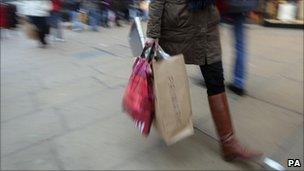UK retail sales fall 1.4% in May
- Published

The ONS said spending had been hit by worries over high fuel prices and job uncertainty
UK retail sales fell 1.4% in May, official figures have shown, reversing the rise seen in April when sales were boosted by the royal wedding.
In April, sales had risen 1.1% on the previous month, reflecting a "spike" due to one-off factors, the Office for National Statistics (ONS) said.
However, May's sales figures were worse than analysts had expected.
The ONS said that food and fuel now accounted for more than half of all spending.
As well as the royal wedding, the warm weather, the timing of Easter and a run of bank holidays had helped to lift sales in April.
However, the ONS said that May's figures showed consumers were now cutting back because of the tough economic climate, worries about rising fuel prices and job uncertainty.
Various sectors had fared differently, with smaller retailers doing slightly better than larger ones, Joe Grice from the ONS said.
Food expenditure was down 3.5% in May - "a pretty direct result of the royal wedding and the April special effects," said Mr Grice.
This was the biggest monthly decline in food store sales since June 2008.
'Absolute stinker'
The figures chimed with warnings from major food retailers earlier in the week.
Tesco had said that UK sales were subdued, blaming high fuel costs and the "cautious consumer environment", while Sainsbury's also warned that rising fuel costs were reducing the amount of money people had available to spend.
Joe Grice of the Office for National Statistics reacts to the figures
Brian Hilliard, chief UK economist at Societe Generale, called the data "an absolute stinker".
"We were all expecting a pullback after the exceptionally strong month of April, but surveys hadn't prepared us for something quite this bad," he said.
"The basic story is clear: the consumer is not prepared to put their head above the parapet and the outlook is very soft.
"But the feature for growth this year is that we shouldn't be relying on the consumer. It's disappointing, but it's not the centre of anyone's forecasts on growth this year," he added.
Pressure
The British Chambers of Commerce (BCC) also said the figures were disappointing.
"On the basis of these figures we reiterate our forecast that GDP (gross domestic product) is likely to grow by only 0.3% in the second quarter of 2011, much less than the OBR [Office for Budget Responsibility] and other analysts are predicting," the group's chief economist David Kern said.
The Office for Budget Responsibility said in its March forecast that it expected the economy to grow by 0.4% in the second quarter.
Mr Kern also said that now was not the right time to raise interest rates.
"Given the pressures facing businesses and consumers, and with the government's fiscal austerity programme continuing to bite, it would be a mistake to raise interest rates in the near future."
Indebted households
Nida Ali, economic adviser to the Ernst & Young Item Club, said the figures reflected subdued consumer sentiment as real incomes were continuing to fall.
On Tuesday, ONS data showed that Consumer Prices Index (CPI) inflation remains at 4.5%, more than twice the Bank of England's target of 2%.
At the same time, research from Incomes Data Services suggests that pay settlements in the public sector are running at zero, while the median settlement in the private sector is 3%.
"Households remain heavily indebted and are eager to reduce, rather than add to their debt burden," Ms Ali said.
"These circumstances are unlikely to change in the near future and we would expect to see weak out-turns for retail sales in the coming months."